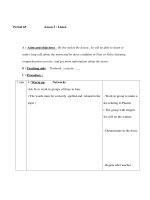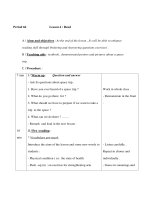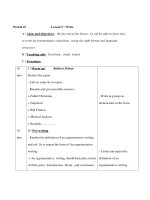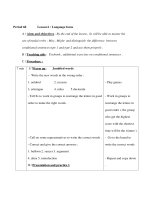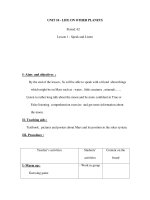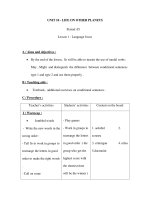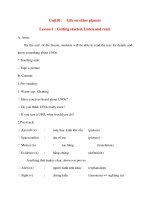Unit 12 Life on other Planets Lesson 7 Looking back project
Bạn đang xem bản rút gọn của tài liệu. Xem và tải ngay bản đầy đủ của tài liệu tại đây (81.79 KB, 3 trang )
<span class='text_page_counter'>(1)</span>UNIT 12 LIFE ON OTHER PLANETS Period 105: Lesson 7: looking back I) Objectives : 1. Educational aim : By the end of the lesson, Ss will be able: - Use the words to talk about life on other planet. - Use the modal verbs: may and might and reported speech skillfully. 2. Knowledge: - Vocabulary : words related the topic. - Grammatical structures lexical items related the topic. II) Teaching aids : Text books, cassette, chalk, visual pictures and some boards. III) Procedure : Steps & ttime A. Warm up ( 5’). Learning activities. - This is the review section of the unit - Tell Ss to record their results for each exercise in the LOOKING BACK section in order to complete the final Finished! Now I can ... assessment. B. Looking I) Vocabulary back 1. Encourage Ss not to refer back to the unit pages. Instead, they can use what they have learn during the unit to help them do the exercises. Vocabulary 1. Rearrange the letters to label the pictures. 2. Fill each gap with a suitable word from the box. 1 &2 Ask to work individually, then compare their answers with a partner. Ask some Ss to write their answers on the board. Key: 1. 1. aliens 2. space buggy 3. weightless 4. solar system 5. planet 6. spaceship 7. Flying saucer 8. Galaxy 2. 1. accommodate 2. surface 3. traces 4. experienced 5. climate 6. NASA Grammar 3, 4 & 5 Ask Ss to do them individually first. Then have Ss check their answers with a partner before having them discuss as a class. Remind Ss to keep record of their original answers so that they can use that information in their self – assessment. 3. Underline the correct answers. Key:. Language focus. Models class work. aliens 2. space buggy 3. weightless 4. solar system planet 6. spaceship 7. Flying saucer 8. Galaxy accommod ate 2. surface 3. traces experience d 5. climate 6. NASA. pair work. individu ally.
<span class='text_page_counter'>(2)</span> 1. if. 2. had been 3. who 4. had been 5. how 6. ate 7. what C. 4. Put the words. Phrases in the correct order to Performing make reported questions. Key: 1. He asked me how I would react if I saw an alien. 2. The teacher asked me which planet was most suitable for human life. 3. My friend asked me when humans had first landed on the moon. 4. She asked me hat the difference between a planet and a star was. 5. They asked if there was water on Mars. 5. Change the following questions into reported questions. 1. The teacher asked her students what the essential conditions for human life were. 2. Samuel asked the scientist if humans had been able to communicate with people on other planets. 3. Nick asked the journalist if the Roswell UFO incident had taken place in the U.S in June 1947. 4. Vanessa asked her uncle who the witness in the Roswell UFO incident had been. 5. The son asked his father when humans would be reported able to travel from one planet to another more easily. speech 6. Diane asked her mother why people couldn’t move to Mars immediately. Communication 6. Choose the right sentences (A-E) to put into the dialogue. First, ask Ss to do the task in pairs. Then check Ss’ answers as a class. Set a time limit of two minutes for Ss to re-read and to remember the dialogue as much as they can. When they finish, ask some pairs to rehearse the dialogue. Key: D. 1. B 2. D 3. A 14. C 5. E Finished! Now I can… Homework Finally ask Ss to complete the self-assessment. Identify any difficulties and weak areas and provide further practice.. individu ally. individu.
<span class='text_page_counter'>(3)</span> *Feedback: ………………………………………………………………………………………… …………………………………………………………………………….
<span class='text_page_counter'>(4)</span>


